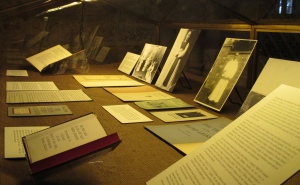 This summer, from June 7th to August 30th in the Margaret Ford Tower, the Burns Library is showcasing an enticing exhibit on the celebrated contemplative master and literary figure, Thomas Merton. Curated by Burns Conservator Barbara Adams Hebard, this exhibit documents some of the connections between Merton, the Humanities Series at Boston College under Francis Sweeney, SJ, and the Burns Library under Brendan Connolly, SJ, that are available for research in Merton-related collections. Father Sweeney, of Humanities Series fame, first encountered Thomas Merton through his poetry. Having read Merton’s recently published poems, Sweeney launched an exchange of correspondence with Merton seeking advice in his own poetic craft. In response, Merton lauded Sweeney’s writing in a letter dated December 3, 1946, “Thanks for the pleasure of reading your poems,” he wrote, “which I really enjoyed.” Merton courteously issued the following statement to accompany Sweeney’s collection:
This summer, from June 7th to August 30th in the Margaret Ford Tower, the Burns Library is showcasing an enticing exhibit on the celebrated contemplative master and literary figure, Thomas Merton. Curated by Burns Conservator Barbara Adams Hebard, this exhibit documents some of the connections between Merton, the Humanities Series at Boston College under Francis Sweeney, SJ, and the Burns Library under Brendan Connolly, SJ, that are available for research in Merton-related collections. Father Sweeney, of Humanities Series fame, first encountered Thomas Merton through his poetry. Having read Merton’s recently published poems, Sweeney launched an exchange of correspondence with Merton seeking advice in his own poetic craft. In response, Merton lauded Sweeney’s writing in a letter dated December 3, 1946, “Thanks for the pleasure of reading your poems,” he wrote, “which I really enjoyed.” Merton courteously issued the following statement to accompany Sweeney’s collection:

“This is a book that has real poems in it. The poet has a penetrating and wise eye, an eloquent and tender and flexible idiom, and a heart full of sympathies which flow along a whole level of American experience—experience which he puts on paper as well as it has ever yet been done. What that experience is can be summed up in two terms: New England – the Society of Jesus. The combination is an interesting one and the poet gives promise of exploiting it to the full.”
Merton also privately ventured some critical suggestions: away from “unsubstantial words” and characterizing some of his poems as seemingly “too young” or “too quaint.” But, on the whole, he encouraged the young Sweeney to continue with his writing. For the Church needed “religious poets” in particular, he commented, those who would surprise and undermine the dominant expectation that priests of the Church had an “uncompromising and unadulterated single-minded preoccupation with the supernatural” and not with the world that the poet recounts.

While the poet enlivens our understanding of the world by the word, Merton also envisioned the poetic task as a distinctively religious one in service of the faith. On the Vigil of Pentecost, Merton wrote to Sweeney, admonishing that his writing would be illuminated by the Holy Spirit, who “after all” “really needs to do our writing for us” Merton said. The same Spirit, of course, would purify the poet first: “but above all [the Spirit] has the far more important task of making us the saints Christ wants us to be before we can even by His kind of poets.” Merton himself, undoubtedly, was electrified by spirituality as well, especially the Eucharist, as he expressed in his letters with Fr. Sweeney. As he deepened his devotion to the contemplative and monastic life, Merton wrote to Sweeney that “Mass…turns out to be more and more marvelous each day.” When he had celebrated Mass, Merton wrote, “I am no longer able to get excited about anything else in the universe”, as a man who had gotten excited about a great many things in his life (Letter from Merton to Sweeney, June 17, 1949, Box 36, Folder 35, Humanities Series Director’s Records, MS.2002.37 John J. Burns Library, Boston College). Such spirituality pervaded Merton’s letters and animated his comments to Sweeney on the occasion of the latter’s priestly ordination, in contrast to those earlier on poetic integrity, that “For neither of us is it important that we also have a tendency to be poets. What could that possibly mean alongside of being Christs?” Still, Merton expressed the hope that Christ might designate Sweeney’s priesthood “accidentally” also for poetry. The Church, commented Merton, “still needs good priests and good poets because of these she has all too few.”
If you have any questions about this exhibit, the Thomas Merton Collection or the Humanities Series – Director’s Records, then please contact the Burns Library Reading Room at 617-552-4861 or burnsref@bc.edu.
- James Daryn Henry, Burns Library Reading Room Student Assistant & Ph.d. Candidate in Theology.
Leave a comment